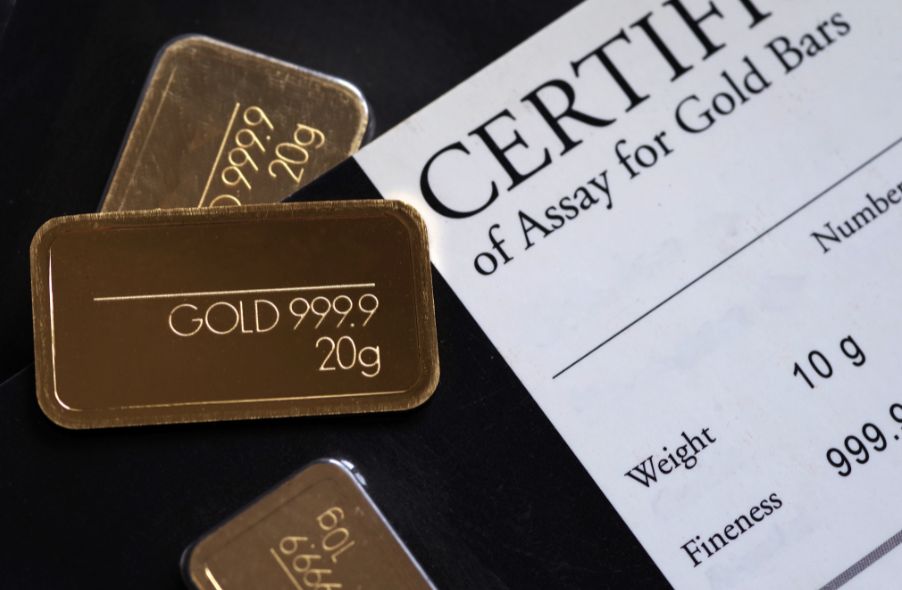
Introduction
Investing in gold has long been considered a stable asset that holds its value over time. However, the logistics and cost of storing physical gold can be a deterrent for some investors. In such cases, investing in paper gold can offer an attractive alternative. This article will explore what paper gold is, the different types of paper gold investments available, and the benefits and risks associated with investing in paper gold.
What Is Paper Gold?
Paper gold refers to any gold-backed asset that is tied to the spot price of gold but does not involve the physical ownership of the metal. Investing in paper gold allows individuals to benefit from the advantages of owning gold without the additional costs of storage, delivery, and insurance fees.
Types of Paper Gold Investment
The paper gold market offers various types of investments, including:
Gold Exchange-Traded Funds (ETFs)
Gold-backed ETFs operate similarly to traditional stocks. The value of these assets fluctuates based on the price of physical gold. Investors can easily buy and trade ETF shares through brokers. When cashing out, investors receive the monetary equivalent of their shares, rather than physical gold.
Physical Gold Certificates
Gold investment certificates allow individuals to own physical gold without the need for physical possession. The certificates represent tangible metal stored in a secure vault, with the storage and security managed by the issuing authority. Alternatively, individuals can purchase gold bullion online from reputable companies and leave the storage responsibility to the seller.
Gold Futures Contracts
Gold futures involve an agreement to purchase a specific amount of physical gold at a predetermined price and time in the future. Investors do not immediately take possession of the metal but rather at the agreed-upon date. Gold futures can be a short-term or long-term investment, and investors can sell the contracts before receiving the physical gold or hold them until the specified date.

Commodity Pools Accounts
Commodity pools are funds that pool and invest capital from multiple individuals or entities. These pooled funds are managed by a professional team responsible for making investment decisions. Commodity pools provide higher liquidity and streamlined management, making them a convenient option for investors looking for a low-maintenance setup.
The Benefits of Paper Gold
Investing in paper gold offers several advantages over physical gold:
Flexibility
Investors can choose the amount of money they want to invest in paper gold, whereas physical gold often requires bulk purchases to make storage and delivery costs practical.
Liquidity
Paper gold investments, such as ETF shares and futures contracts, can be easily converted into cash when market conditions are favorable. Trading can be done through reputable stock exchanges or online platforms, offering quick and convenient transactions.
Lower Associated Costs
When investing in paper gold, there is no need to pay for shipping, secure storage, or insurance. The only additional cost is the broker's commission. In contrast, the costs of storing and insuring physical gold can accumulate over time.
No Storage Concerns
Investors do not need to worry about the loss or theft of their precious metals when investing in paper gold.

The Risks of Paper Gold Investment
While paper gold offers its benefits, there are also risks to consider:
Dependence on Third Parties
Investors in paper gold rely on the financial institution or fund that issued their gold-backed securities. If the organization faces a crisis due to mismanagement or other factors, investors' holdings may be at risk.
Valuation Discrepancies
Tracking errors, management fees, and other factors can lead to price discrepancies between the spot price of physical gold and the value of gold-backed assets.
Market Volatility
Gold-backed assets, such as futures contracts, can be more susceptible to market fluctuations compared to physical gold.
No Physical Ownership
Investors do not have the satisfaction and security of holding physical gold when investing in paper gold.
Should You Invest in Physical Gold?
Despite the convenience of paper gold, physical gold remains a popular choice as a safe hedge investment. The stability and intrinsic value of physical gold make it an attractive option for many investors. The benefits of physical gold include:

Ironclad Intrinsic Value
Physical gold holds its value regardless of market trends or investment decisions made by third parties.
Stability
Gold has maintained its value for centuries and is considered a valuable commodity that can withstand economic uncertainties.
Security
Physical gold is not vulnerable to hacking or cyber threats, providing a sense of security for investors.
Tradability
Physical gold can be easily exchanged for cash, making it a highly liquid asset even during economic crises.
However, owning physical gold also comes with its own concerns:
Markup Prices
Purchasing physical gold often involves paying a markup on top of the metal's spot price. Larger gold bars may have a lower markup but can be more challenging to sell.
Storage and Insurance Costs
Secure storage is necessary for substantial amounts of physical gold, which may require annual fees and insurance. Burglary and natural disasters pose risks to the stored gold.
Slower Liquidity
Although physical gold can be sold, it may take longer compared to trading ETF shares or digital gold assets. Dealers' fees may also apply when selling gold bullion.
Factors to Consider When Choosing Between Paper Gold and Physical Gold
Investors do not have to choose exclusively between paper gold and physical gold. Diversifying their investment portfolio can help mitigate risks and maximize returns. During an economic crisis, physical gold tends to appreciate in value while paper assets may depreciate.
Investors should consider their investment goals, risk tolerance, and consult with an investment advisor before allocating a significant amount of funds to any gold investment.
Consider a Gold IRA
A Gold IRA combines the security of physical bullion with the convenience of paper gold. Certain self-directed IRAs allow individuals to hold physical precious metals like gold, silver, and platinum, in addition to precious metal shares and securities. Gold IRAs have gained popularity as a way to protect wealth during economic uncertainties.
Both paper gold and physical gold offer attractive options, and the choice depends on an individual's preferences and investment objectives. It is essential to choose a reliable IRA partner that meets specific needs. Conducting thorough research and considering past returns and associated management costs are recommended.
Frequently Asked Questions
Can I keep physical gold in an IRA?
Not just paper money or coins, gold is money. People have used gold as a currency for thousands of centuries to preserve their wealth and keep it safe from inflation. Today, investors use gold as part of a diversified portfolio because gold tends to do better during financial turmoil.
Many Americans now invest in precious metals. It's not guaranteed that you'll make any money investing gold, but there are several reasons it might be worthwhile to add gold to retirement funds.
Another reason is that gold has historically outperformed other assets in financial panic periods. The S&P 500 declined 21 percent during the same period. Gold prices increased nearly 100 per cent between August 2011 – early 2013. During these turbulent market times, gold was among few assets that outperformed the stocks.
Gold is one of the few assets that has virtually no counterparty risks. Even if your stock portfolio is down, your shares are still yours. You can still own your gold even if the company where you invested fails to pay its debt.
Finally, gold provides liquidity. This allows you to sell your gold whenever you want, unlike many other investments. Gold is liquid and therefore it makes sense to purchase small amounts. This allows you to take advantage of short-term fluctuations in the gold market.
Can the government take your gold?
Your gold is yours and the government cannot take it. You earned it through hard work. It is yours. But, this rule is not universal. You could lose your gold if convicted of fraud against a federal government agency. You can also lose precious metals if you owe taxes. However, even if you don't pay your taxes, your gold can be kept as property of the United States Government.
What's the advantage of a Gold IRA?
There are many benefits to a gold IRA. It's an investment vehicle that lets you diversify your portfolio. You control how much money goes into each account and when it's withdrawn.
You can also rollover funds from other retirement accounts to a gold IRA. This will allow you to transition easily if it is your decision to retire early.
The best part about gold IRAs? You don't have to be an expert. They are readily available at most banks and brokerages. Withdrawals are made automatically without having to worry about fees or penalties.
There are also drawbacks. The volatility of gold has been a hallmark of its history. Understanding why you want to invest in gold is essential. Do you want safety or growth? Are you looking for growth or insurance? Only then will you be able make informed decisions.
If you plan on keeping your gold IRA alive for a while, you may want to consider purchasing more than 1 ounce of pure gold. A single ounce isn't enough to cover all of your needs. Depending on your plans for using your gold, you may need multiple ounces.
A small amount is sufficient if you plan to sell your gold. You can even get by with less than one ounce. But you won't be able to buy anything else with those funds.
Which precious metal is best to invest in?
Answering this question will depend on your willingness to take some risk and the return you seek. Gold is a traditional haven investment. However, it is not always the most profitable. For example, if your goal is to make quick money, gold may not suit you. Silver is a better investment if you have patience and the time to do it.
If you don’t desire to become rich quickly, gold may be your best option. If you want to invest in long-term, steady returns, silver is a better choice.
What Is a Precious Metal IRA?
An IRA with precious metals allows you to diversify retirement savings into gold and silver, palladium, rhodiums, iridiums, osmium, or other rare metals. These are “precious metals” because they are hard to find, and therefore very valuable. They are great investments for your money, and they can protect you from inflation or economic instability.
Bullion is often used for precious metals. Bullion is the physical metal.
Bullion can be bought via various channels, such as online retailers, large coin dealers and grocery stores.
With a precious metal IRA, you invest in bullion directly rather than purchasing shares of stock. This means you'll receive dividends every year.
Precious Metal IRAs don’t require paperwork nor have annual fees. You pay only a small percentage of your gains tax. Plus, you can access your funds whenever you like.
How much gold should you have in your portfolio?
The amount you make will depend on the amount of capital you have. You can start small by investing $5k-10k. As you grow, it is possible to rent desks or office space. Renting out desks and other equipment is a great way to save money on rent. Rent is only paid per month.
Consider what type of business your company will be running. In my case, we charge clients between $1000-2000/month, depending on what they order. If you are doing this type of thing, it is important to think about how much you can expect from each client.
If you are doing freelance work, you probably won't have a monthly salary like I do because the project pays freelancers. You might get paid only once every six months.
You must first decide what kind and amount of income you are looking to generate before you can calculate how much gold will be needed.
I suggest starting with $1k-2k gold and building from there.
Statistics
- If you accidentally make an improper transaction, the IRS will disallow it and count it as a withdrawal, so you would owe income tax on the item's value and, if you are younger than 59 ½, an additional 10% early withdrawal penalty. (forbes.com)
- Indeed, several financial advisers interviewed for this article suggest you invest 5 to 15 percent of your portfolio in gold, just in case. (aarp.org)
- Gold is considered a collectible, and profits from a sale are taxed at a maximum rate of 28 percent. (aarp.org)
- This is a 15% margin that has shown no stable direction of growth but fluctuates seemingly at random. (smartasset.com)
- If you take distributions before hitting 59.5, you'll owe a 10% penalty on the amount withdrawn. (lendedu.com)
External Links
law.cornell.edu
- 7 U.S. Code SS7 – Designation boards of trade as contract market authorities
- 26 U.S. Code SS 408 – Individual retirement account
irs.gov
investopedia.com
wsj.com
- Saddam Hussein’s InvasionHelped Uncage a Bear In 1989 – WSJ
- You want to keep gold in your IRA at home? It's Not Exactly Lawful – WSJ
How To
Investing in gold or stocks
Gold investing as an investment vehicle can seem extremely risky these days. This is because many people believe gold is no longer financially profitable. This belief comes from the fact most people see gold prices falling due to the global economy. They think that they would lose money if they invested in gold. However, investing in gold can still provide significant benefits. Below are some of them.
Gold is one of the oldest forms of currency known to man. It has been in use for thousands of year. It has been used as a store for value by people all over the globe. Even today, countries such as South Africa continue to rely heavily on it as a form of payment for their citizens.
It is important to determine the price per Gram that you will pay for gold when making a decision about whether or not to invest. When looking into buying gold bullion, you must decide how much you are willing to spend per gram. If you don’t know what the current market price is, you can always call a local jewelry store and ask them their opinion.
It is important to remember that even though gold prices have dropped in recent times, the cost of making gold has risen. Although gold's price has fallen, its production costs have not.
Another thing to remember when thinking about whether or not you should buy gold is the amount of gold you plan on purchasing. If you plan to buy enough gold to cover your wedding rings then it is probably a good idea to wait before buying any more. But, if your goal is to make long-term investments in gold, this might be worth considering. You can profit if you sell your gold at a higher price than you bought it.
We hope that this article has helped you gain a better understanding and appreciation for gold as an investment option. We strongly recommend that you research all available options before making any decisions. Only then can you make informed decisions.
—————————————————————————————————————————————————————————————–
By: Learn About Gold
Title: The Benefits and Risks of Investing in Paper Gold
Sourced From: learnaboutgold.com/blog/paper-gold/
Published Date: Wed, 10 Jan 2024 23:00:55 +0000














